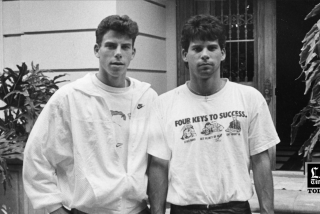Los Angeles fuel magnate’s brother indicted on money laundering charges
The brother of Levon Termendzhyan, a Southern California fuel magnate who was convicted of defrauding the U.S. government in a renewable energy scam, has been indicted on charges of laundering millions in stolen money.
Grigor Termendjian was charged with money laundering, conspiring to commit money laundering and conspiring to defraud the federal government, records show. A grand jury in Salt Lake City handed up the indictment in March, and the case became public only recently.
Termendjian’s younger brother, who is also known as Lev Aslan Dermen, was sentenced last month to 40 years in prison. He was convicted in 2020 of conspiring with members of a Utah-based polygamist sect to claim tax credits for biofuel they never produced. The scheme fleeced the U.S. Treasury of about $511 million, much of which has not been recovered, prosecutors said.
About $133 million was sent to accounts in Turkey and Luxembourg held by Sezgin Baran Korkmaz, prosecutors said in the indictment against Termendjian. A businessman with ties to Turkish government officials, Korkmaz was arrested in Austria and extradited last year to Utah, where he has pleaded not guilty to charges of money laundering, wire fraud and witness tampering.
About half the money sent overseas — $63 million — was re-routed to U.S. accounts controlled by Termendjian and his brother, prosecutors alleged. The indictment charges that Termendjian, along with unnamed conspirators, sought to disguise the source of the money by misrepresenting the transfers as investments, loans and share purchases, drawing up phony paperwork to make the transactions appear legitimate.
Termendjian and his associates used the money to buy a waterfront home in Huntington Beach in 2015 and other assets such as an apartment building and heavy machinery, according to the indictment. In one instance, the document says, he used funds from an account he shared with his brother to purchase two cashier’s checks, $21 million and $20 million apiece, made payable to himself.
Termendjian has pleaded not guilty to money laundering and conspiracy charges. Unlike his brother, Termendjian was not detained and required only to surrender his U.S. and Armenian passports. Termendzhyan, however, was held without bail after prosecutors painted him as a flight risk with access to private planes and millions in overseas accounts.
Termendjian’s lawyer did not return a request for comment.
Before he was indicted, Termendjian was fending off the government’s effort to seize assets that prosecutors maintain were bought with stolen money: a $3.5-million mansion in Huntington Beach, a car wash in Van Nuys, an office building in Corona and a liquefied natural gas plant in the Mojave desert.
The plant, which Termendjian began building in 2011, would convert 100,000 gallons of natural gas a day into liquid form, his lawyer, Sam Meziani, wrote in court papers. It remains under construction.
Meziani said Termendjian sold his brother a 50% share in the project for $18 million in “good faith,” unaware of the “complex and well-hidden IRS fraud for which his brother was convicted.”
Meziani claimed Termendzhyan no longer has an interest in the facility. The brothers fell out in 2015, he wrote. No longer on speaking terms, Termendzhyan told their father at a birthday party for his mother the following year that he wanted out of the project. “In deference to his father,” Meziani wrote, Termendjian agreed to return his brother’s money.
Termendjian emigrated from Armenia with his family when he was 16, settling in Los Angeles, Meziani wrote. He got a job at a jewelry store before buying one of his own at 21, while helping his father run a gas station in Hollywood at night.
When Termendjian was 30, he and his brother were arrested by Internal Revenue Service agents on charges of pocketing taxes owed on diesel. The scheme allowed them to undercut legitimate vendors who were paying the excise tax, which made up as much as one-third of the price of fuel, officials said at the time.
The brothers were acquitted in that case. Termendzhyan would trade on its outcome, telling his associates he got off by paying the authorities overseeing his case a $10-million bribe, Leslie Goemaat, an assistant U.S. attorney, wrote in court papers.
His conspirators in the Utah-based fraud testified they sent millions to accounts under Termendzhyan’s control, believing they were purchasing the protection of what he called “the umbrella.”
No evidence has emerged to support Termendzhyan’s alleged claim of buying his way out of the tax case, but it is undisputed that he surrounded himself with corrupt law enforcement officials. Among them were John Saro Balian, a Glendale narcotics detective and the department’s former spokesman, and Felix Cisneros Jr., a Homeland Security Investigations agent. Both men were convicted of corruption-related offenses and sent to prison.
Before his brother was sentenced in April, Termendjian wrote in a letter to U.S. District Judge Jill N. Parrish that the two have not spoken in nearly eight years.
Despite their “differences,” Termendjian wrote, “I know that deep down he is a good person.”
More to Read
Sign up for Essential California
The most important California stories and recommendations in your inbox every morning.
You may occasionally receive promotional content from the Los Angeles Times.










